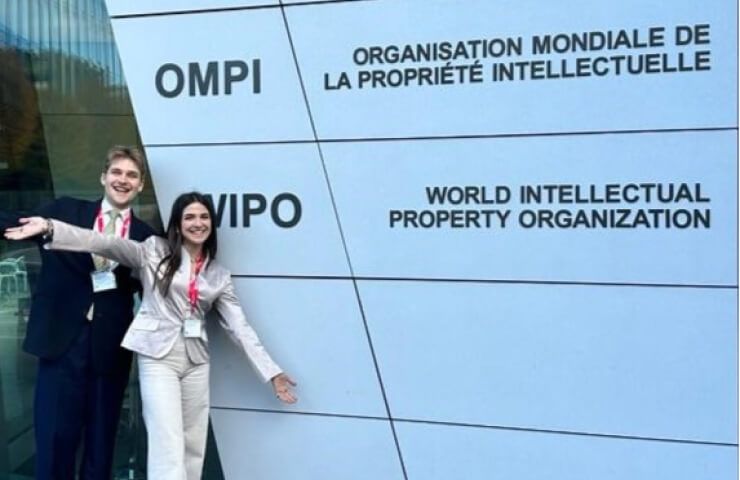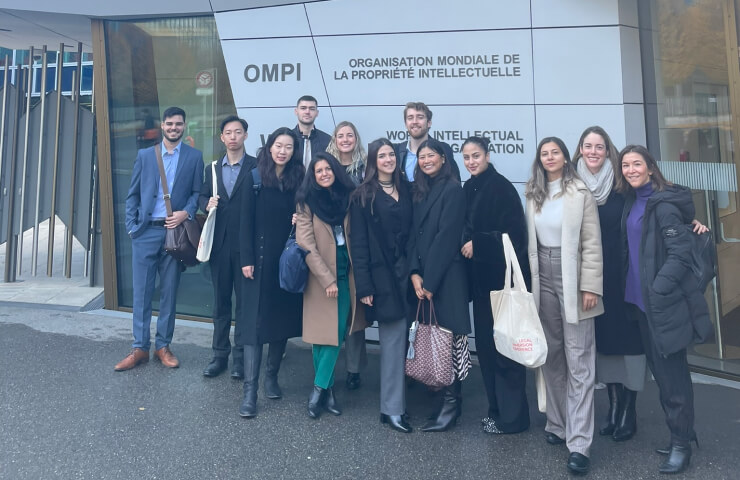Studying at IE University means diving head-first into experience. From clubs and lectures to networking events and more, our students are exposed to the world of work from day one. Our Master of Laws (LL.M.) at IE Law School places students at the heart of it all, with networking opportunities, clubs and more.
The IE IP Club at IE Law School takes experience to the next level. The club has designed a series of talks called the WIPO Expert Series, which aim to give an inside look at how IP law can be used to protect creativity and innovation. This series offers aspiring IP professionals access to leading IP practitioners and policymakers, real-world insights and practical knowledge, updates on the latest IP trends and opportunities for networking and professional growth.
Sweder van Zuylen and Vittoria Amigoni are students of the Master of Laws (LL.M.) with a specialization in Intellectual Property and Technology Law.
Both members of the IP Club, Sweder and Vittoria recently shared their experiences with the WIPO Expert Series.

Tell us about the WIPO Expert Series and why it’s important.
Sweder: The WIPO Expert Series connects me directly with leading figures in the field—not only academics, but the people actively shaping the future of intellectual property. Beyond lectures that delve into copyright law in the digital age and the future of IP in the era of AI, the WIPO Expert Series provides a window into the work of WIPO as a UN agency. Participating in the series was a game-changer for my understanding of IP law and the efforts carried out to harmonize IP frameworks.
Vittoria: Aimed at enhancing our understanding of intellectual property, the WIPO Expert Series sessions provided us with in-depth knowledge of various IP areas such as patents, trademarks, trade secrets and copyright. Plus, the series keeps us updated on the latest developments at WIPO, as well as trends in international IP law. The chance to discuss these topics with some of the most renowned professionals in the field contributed significantly to my academic and professional growth.
How were the themes and experts chosen for the WIPO Expert Series?
Vittoria: The themes were chosen based on their current relevance in today’s IP landscape, and the experts were chosen based on their knowledge of the specific theme. This ensured that the content was both up to date and highly insightful. By covering a broad range of IP topics, the series addressed critical emerging issues, from patent law to the evolving challenges in digital copyright.
How can participating in the WIPO Expert Series benefit students’ academic and career paths in intellectual property law?
Sweder: The series offers a plethora of benefits for our academic and professional journeys in IP law. As we have the opportunity to deepen our understanding, broaden our perspectives and gain real-world insights into how IP law functions on a day-to-day, the series keeps us ahead of the curve. What’s more, the series bridges the gap between theory and practice because we can see the principles we are learning come to life.

It’s also a fantastic platform for networking—we had the chance to connect with peers who share our passions, as well as with professionals who could offer guidance.
Could you share some highlights from the WIPO Expert Series?
Sweder: A highlight for me was the lecture on trade secrets. I learned more about their significance as a valuable asset in a business’ intellectual property toolbox, particularly for small businesses. The lecture also emphasized the strategic integration of trade secrets with other IP tools like public relations, investor pitches and even patents to create a comprehensive protection strategy.
Vittoria: One session that stood out to me was a two-folded lecture on international copyright law. Paolo Lanteri offered a deep dive into the evolving nature of copyright law and its implications, particularly in the music industry. The session explored the differences between audiovisual and music revenue models, and how rights are managed and enforced. Paolo highlighted the importance of staying updated on legislative changes and adapting to new technological realities—which is crucial for anyone pursuing a career in IP law.
Why should future students choose the Intellectual Property and Technology Law specialization for their Master of Laws (LL.M.)?
Sweder: International IP law plays a pivotal role in fostering innovation and creativity on a global scale. It establishes a framework for protecting intellectual property rights across boards, encouraging collaboration and knowledge sharing. This, in turn, fuels technological advancement and economic growth. The WIPO Expert Series in particular opened my eyes to the vast opportunities that international IP law offers. By understanding the nuances of global IP frameworks, I can better navigate the legal landscape and ensure the protection of intellectual property across different jurisdictions. International IP law is a cornerstone of a thriving global innovation ecosystem, and the WIPO Expert Series equipped me with the tools to be part of it.
Vittoria: International IP law is not just a set of rules but a powerful instrument available to everyone to make creativity, innovation and economic development a reality. The inclusive approach WIPO takes ensures that IP becomes a tool for everyone, not just a privileged few. The WIPO Expert Series has shown me that IP is more than just legal constructs—it’s a dynamic and adaptable framework that can drive positive change.
Curious about intellectual property law?
Explore how the WIPO Expert Series by IE Law School’s IP Club provides aspiring IP professionals with invaluable insights and networking opportunities in intellectual property law.






